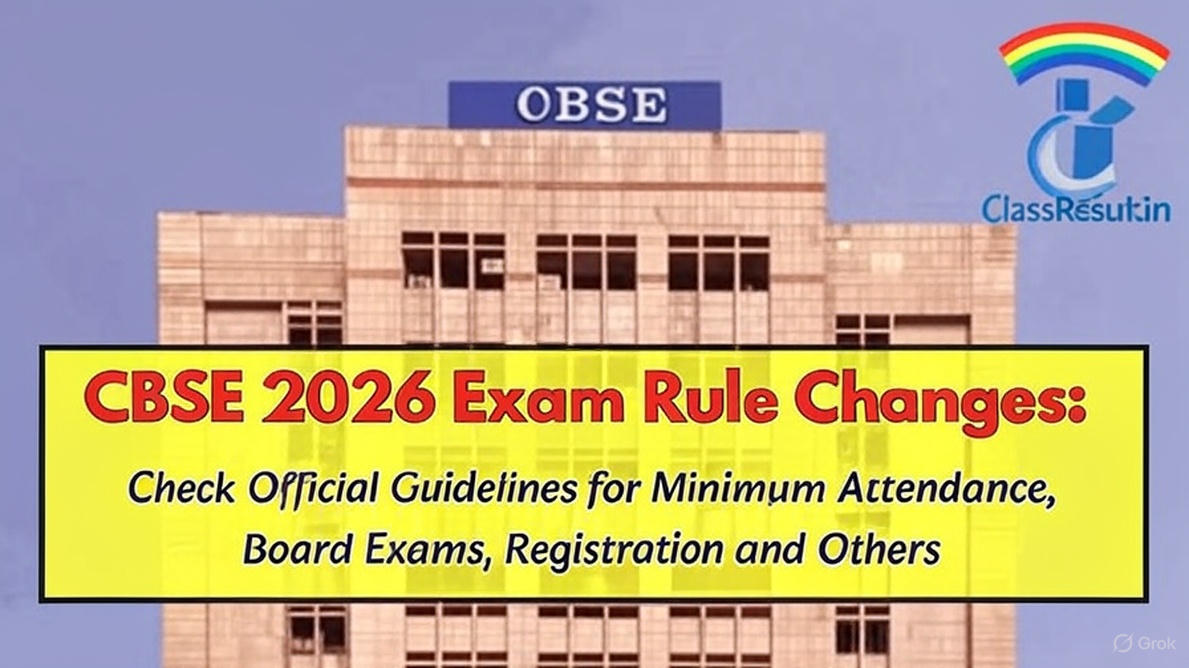CBSE 2026 Exam Rules: Two Exams, 75% Attendance & More

The Central Board of Secondary Education CBSE is introducing significant changes to the Class 10 board exam system starting from the 2025–2026 academic year, with the first exams under the new rules scheduled for 2026. These reforms align with the National Education Policy (NEP) 2020 and aim to reduce student stress, increase flexibility, and ensure academic integrity.
Major Changes in CBSE 2026 Exam Rules
Mandatory 75% Minimum Attendance: Students must have at least 75% attendance to be eligible for board exams.
Compulsory Internal Assessments: Internal assessments such as projects and practicals will be conducted once before the February exam.
Two Exam Windows Per Year:
Full Syllabus for Both Exams: Both February and May exams will cover the entire academic year syllabus with no changes in pattern or marking.
Strict Registration via Pariksha Sangam Portal: Schools must register all candidates correctly for the first exam; no additions allowed for the second exam.
Two-Year Study Requirement: Students must complete two years of study for Classes 10 and 12 to be eligible.
Result Timelines:
Final Marksheet and Certificates: Issued only after the May exam, based on the best performance across both exams.
Performance Document: Available on DigiLocker after February exam for admission purposes if students opt out of the May exam.
Who Can Appear for the Second Exam?
Improvement Candidates: Students who passed in February but want to improve scores in up to three subjects.
Compartment Candidates: Students who failed in one or two subjects in February.
Special Cases: Students who missed exams due to sports or those from winter-region schools.
Essential Repeat: Students missing three or more subjects in February must repeat the year and cannot appear in May.
Implications for Stakeholders
Students: Gain a second chance to improve scores, reducing pressure from a single exam. They can choose to skip the May exam if satisfied with February results.
Teachers: Need to adapt lesson plans for continuous teaching and assessment throughout the year and guide students on retake decisions.
Parents: Shift from pressuring for one-time results to supporting ongoing learning and informed decision-making.
Schools: Must ensure accurate candidate registration and timely completion of internal assessments.
Challenges and Considerations
Ensuring quality coaching to help students decide whether to retake exams.
Maintaining consistent teaching and assessment beyond February.
Administrative readiness for system updates and data accuracy.
Monitoring if the two-window system truly reduces stress without increasing overall burden.
The CBSE 2026 exam reforms replace the traditional single exam with a flexible two-window system, aiming to balance rigor with reduced anxiety. Success depends on effective planning, continuous evaluation, and collaboration among students, teachers, parents, and schools. These changes promise to empower students with greater control over their academic outcomes and promote a culture of lifelong learning.